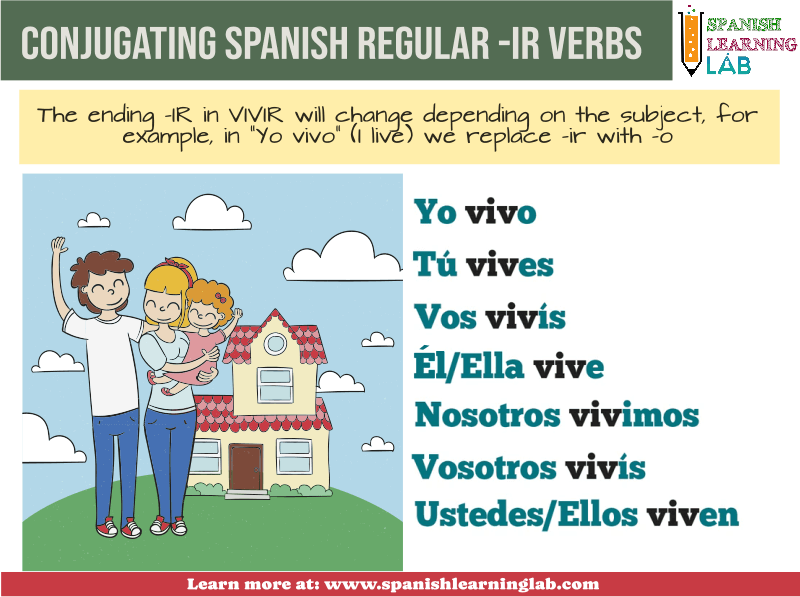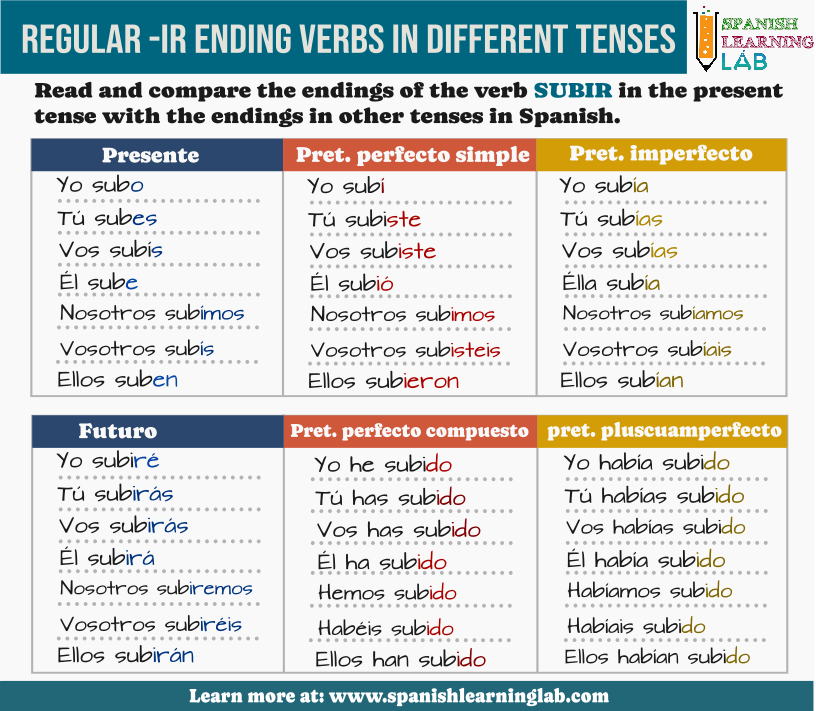¡Hola! Thank you for learning Spanish with us. This time, we will cover the conjugation rules for regular verbs ending in -IR, both in the present tense and in other essential tenses in the language. The lesson includes many examples and grammar exercises through several interactive quizzes to help you get the most out of the topic. Let’s get started…
Spanish regular -IR ending verbs in the present tense
As you probably know, Spanish verbs end in -AR, -ER, and -IR in their base forms. Some common examples of regular verbs ending in -IR are VIVIR, ABRIR, and PARTIR. To conjugate these verbs, we must replace the -IR ending with one or more letters, following specific rules depending on the main subject of the sentence. Pay attention to how the ending of the verb VIVIR changes for each pronoun in the image below:

In the image above, we can see how the verb “VIVIR” changes its ending depending on the pronoun it goes along with. In none of its conjugations, VIVIR is used in its infinitive form, so saying something like “Yo vivir” meaning “I live” would be incorrect. Following this rule, we can change the ending of other regular verbs ending in -IR, such as ABRIR and PARTIR, just like this:
- ABRIR: Yo abro, tú abres, él abre, nosotros abrimos, vosotros abrís, ellos abren.
- PARTIR: Yo parto, tú partes, él parte, nosotros partimos, vosotros partís, ellos parten
The image below shows a list of several Spanish regular verbs ending in IR, which would undergo the above ending changes in the present tense

Interactive quiz No. 1
Complete the list of conjugations for these Spanish verbs in the following interactive quiz.
Making sentences with -IR ending regular verbs
To form basic sentences with these verbs, we will need a subject, a verb, and an object. As we explained before, the subject is optional in many cases, but conjugating the verb correctly is essential to understand who we are referring to when we say something. Keep in mind that the conjugations we’ve covered so far are for verbs in the present tense exclusively. Here are some sentences using several IR ending verbs in Spanish:
|
PERMITIR – La maestra permite que usemos el diccionario en clases.
TO ALLOW – The teacher allows us to use the dictionary in class.
|
|
DECIDIR – Yo siempre decido seguir la mejor estrategia.
TO DECIDE – I always decide to follow the best strategy.
|
|
SUBIR – Tú subes de puesto rápidamente. ¡Felicidades!
TO GO UP – You’re moving up quickly. Congratulations!
|
|
RECIBIR – Vos recibís ayuda del gobierno, ¿verdad?
TO RECEIVE – You receive help from the government, right?
|
|
AÑADIR – Él le añade pimienta y sal a los tacos.
TO ADD – He adds pepper and salt to the tacos.
|
|
DESCRIBIR – Marta describe a su familia en la clase.
TO DESCRIBE – Marta describes her family in class.
|
|
ESCRIBIR – Usted escribe poemas muy buenos.
TO WRITE – You write very good poems.
|
|
VIVIR – Nosotros vivimos cerca de la Torre de Tokio.
TO LIVE – We live near the Tokyo Tower.
|
|
PROHIBIR – Vosotros prohibís fumar dentro de la cafetería.
TO PROHIBIT – You prohibit smoking inside the cafeteria.
|
|
REUNIR – Ellos se reúnen en esa sala todos los viernes.
TO MEET – They meet in that room every Friday.
|
Interactive quiz No. 2
Complete these sentences with the correct conjugation of each regular verb in parentheses in the present tense.
Conjugating regular -IR verbs in other tenses
Regular verbs ending in -IR also change their ending following conjugation rules in other tenses in the indicative mode (el indicativo). To conjugate them correctly, it is necessary to recognize the most common regular verbs and remember how the verb ending changes depending on the subject for the tense we need. Some verbs are regular for all tenses, except in their participle form, such as the verbs ESCRIBIR (to write) and CUBRIR (to cover), which are conjugated as “escrito” and “cubierto” in the participle, respectively. The following picture shows the correct way to conjugate the verb SUBIR in different tenses in Spanish:

Here are some examples of sentences with regular verbs ending in IR in some of the tenses shown in the image above.
|
DESCUBRIR – Miguel descubrió las ruinas de una ciudad maya por accidente.
TO DISCOVER – Miguel discovered the ruins of a Mayan city by accident.
|
|
INCURRIR – Ella incurría en gastos innecesarios cada mes.
TO INCUR – She had unnecessary expenses every month.
|
|
RECURRIR – Los abogados recurrieron a la corte para defenderlos.
TO RESORT TO – The lawyers went to court to defend them.
|
|
INHIBIR – Las drogas han inhibido su percepción del peligro.
TO INHIBIT – The drugs have inhibited your perception of danger.
|
|
ENTUMIR – Mis pies se han entumido por estar de pie tanto tiempo.
TO NUMB – My feet have gone numb from standing for so long.
|
|
ESCUPIR – Al principio, él escupía el piso todo el tiempo, pero ha cambiado.
TO SPIT – At first, he would spit on the floor all the time, but that has changed.
|
|
CONVIVIR – Tú convivirás con estudiantes de todas las nacionalidades.
TO COEXIST – You will live with students of all nationalities.
|
|
ACUDIR – Nosotros no acudiremos a la presentación por falta de tiempo.
TO ATTEND – We will not be attending the presentation due to lack of time.
|
|
DIMITIR – El primer ministro dimitió al ser acusado de corrupción.
TO RESIGN – The prime minister resigned after being accused of corruption.
|
| ABURRIR – Durante la cuarentena, me aburría de todo muy rápido. TO GET BORED – During quarantine, I got bored with everything very quickly. |
Interactive quiz No. 3
Drag and drop the right conjugations for each IR ending verb to the correct blank spaces.
PDF Worksheets about this topic:
- Spanish Verbs Conjugation (Present Tense)
- Conjugating -IR Regular Verbs in Spanish (Present)
- Spanish Regular -IR Verbs in the Present Tense
